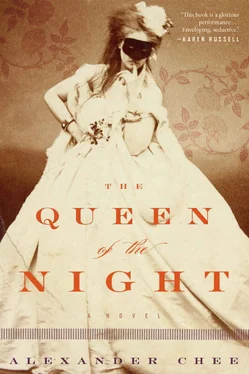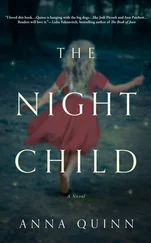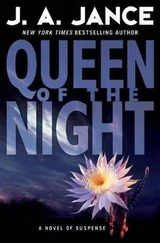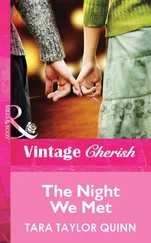These rabbits I watched stew, they were rare, I knew it. I wished I knew how to make the blood sausage.
Have you never seen him, then? Aristafeo asked me, and I knew without his saying who he meant.
No, I said.
Then the dogs’ work is done, he said.
I nodded dumbly.
There aren’t even rats anymore. The dogs will be taken from me soon, I think, he said. I would prefer they die at my hands.
He had never once spoken this way of them. What do you say? he asked.
I couldn’t say, I replied, and shrugged. I had never loved them, but I knew he had — I knew he did not say this lightly. I knew he had become proud of the way he’d never eaten them. But we risked becoming weaker than those who had eaten their dogs already and becoming prey to them.
Game is better than carrion, he finally said. It is Christmas in a few days. I’ll do it before then.
I laughed to think of dogs for Christmas.
We’ll feast, he said, and pray for an end to the Siege. Though it has brought at least one gift.
I watched him, expectant.
Is it that the Siege has set you free, then? he said.
It may be.
It was good of the Germans to do this for you, then. He looked up at me and raised his glass. Cheers to them. From his pocket, he removed a gold ring with a large green stone, and then he went to his knee.
This ring belonged to my mother, he said. A gift from her for my future bride. It is Roman, very ancient, in her family for generations.
I took it from him and held it up, turning it over in my hand. The ring looked like something that had fallen out of one of the paintings in the Tuileries. It did not fit on any of my fingers, though, and it began to slide off. I held the hand up and examined the beautiful color of the stone in the light.
Will you be my wife? he asked.
If I was to be married, it would be like this. I drew my hand across his face so the ring grazed his cheek.
Yes, I said. I was always yours, but, yes, I will be yours.
§
At the end of the third week, Paris was shelled for three days straight. Aristafeo’s house in the Marais was unhurt.
Parisians, starving and bored by the long siege, had taken to watching the shells land as a sport, with picnics of only wine; while lacking for food, we did not lack for drink. We were told to keep buckets of water by the door in case of fire and to leave our doors unlocked in case a passerby required shelter from a shell.
Occasionally, they exploded and there was terrible death, but then also came children anxious to collect the fragments, which they hoped to sell as souvenirs. To whom I did not know.
I remember a woman who had died in the shelling. Her body stayed for nearly a week; no one dared or cared to move her. If you did not look closely, she seemed to be a peddler’s bundle. I thought to try to remove her, but I did not know where to bring her or whom to call on to remove her body.
When she was finally removed, I was almost as afraid as when she was there.
I remember a man passed me on the street, moving with an eerie quiet. Only as he passed me did I notice he was covered in blood, smeared all across him. He carried against his chest a bundle soaked in blood and filthy. He had torn his sleeve to tie it up.
I thought to ask if he needed help, but he did not ask for any. He moved quietly instead, intent. I did not exist to him. He was trying to go unnoticed, I think, or he had gone mad. I let him go by.
His package, I had noticed, was the exact size and shape of someone’s head.
When news of the armistice came, we were initially relieved for there were not even chestnuts now in the Bois, much less anything that fed on the chestnuts, and Aristafeo had pledged to me again that he could eat his dogs if needed.
Many had been less scrupulous than he.
You stood before a tree and had to decide what of it could be eaten and what used to heat your house.
And yet, hungry as we were, we did not know the hunger to come.
THE PRUSSIANS MARCHED into Paris in a parade after the armistice was signed — a parade that was among the conditions of the treaty, culminating with a coronation of the German Emperor at Versailles. From the papers, we knew the German Emperor had already been declared Emperor at Versailles — done to demoralize Paris — but now it seemed he wanted to sit there and have the crown dropped onto his head while surrounded by all those mirrors.
First, however, we were to endure the soldiers at their victory feast in our midst.
These well-fed German soldiers marched in orderly rows onto the Champs-élysées, and I looked to see if the tenor was among them. There was the possibility he had been conscripted; I knew from him that all German men were forced to enlist. But while many of the soldiers looked to have been the tenor’s brothers, I did not see him.
Despite the talk of ambushing them or burning them with Greek fire, in the end our conquerors went unharmed, free to enjoy the bistros, newly stocked by the “Refurbishment,” as the return of food and drink was called, and to drink to their content, even singing songs.
Some were very good singers.
Some became lost in the Bois de Boulogne and had to ask for directions from passersby.
Aristafeo and I enjoyed the parade from a table at a café, seated with some bread and wine. We had been alone together so long, it had seemed as if we might be the only people left alive and, instead, here we were in a crowd. I was painfully aware on seeing the soldiers of how thin I was and noticed how they paid me no mind. I must look like a ghost , I thought, and was relieved there were at least no German women for Aristafeo to compare me to; the only beauties in sight were the soldiers.
I was watching the filles en carte entertaining the Prussians in the café where we were. When the soldiers were gone, men pulled these women into the street, shouting at them, insulting them. They tore their clothes off and shouted at them some more as they sobbed, holding the shreds of their clothes over their dirty ribs in shame.
Let’s go, I said to Aristafeo, as it began.
I was shaken; it could as easily have been me. I wondered where it would end. They may as well have burned the tables where the soldiers sat, the bars where they drank, the streets where they walked, even Versailles.
When the new government of the Third Republic demanded that all back rent and taxes owed from the time of the Siege were due to be paid within two days, only the butcher who had sold the meat from the animals of the zoo had anything with which to pay — the butcher and the coquettes. Most had nothing, unable to make a living for half the year.
There was a revolt. The new government troops were evicted, their weapons confiscated, and the Commune of Paris was declared. And as costly as food was during even the Refurbishment, months later, as I waited out the Commune, I would think those prices bargains.
§
The moment to leave, between the armistice and the Commune, came and went with such suddenness that only after the Commune began did I understand we should have left then. Instead, Aristafeo and I continued as we had in his house in the Marais, living as husband and wife. I wore his ring on a leather strap at my throat, where it would not fall off. He played his piano and I sang, and we returned to drinking wine to stave off hunger once the shortages began again.
There had still never been even one sign of the tenor, and perhaps it was all of the wine, or the hunger, but I came to believe at times that he’d been killed in the war and that I was, as Aristafeo had said, free at last. My curiosity to know the truth got the better of me, however, and one day in March I returned to the apartment on the avenue de l’Opéra to see what was there that I might take — and see if there was even one clue as to his existence.
Читать дальше












